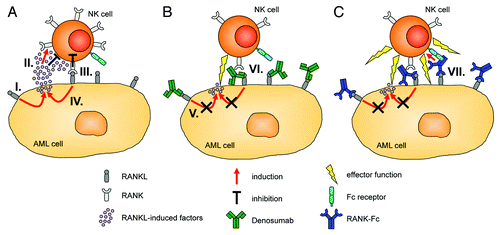Figures & data
Figure 1. Involvement of RANKL in the crosstalk of acute myeloid leukemia (AML) and natural killer (NK) cells and potential points of therapeutic intervention. (A) Receptor activator of NFκB ligand (RANKL) signaling induces the release of immunomodulatory factors by AML cells (I), which directly inhibit NK-cell reactivity and upregulate RANK expression on their cell surface (II). RANK transduces inhibitory signals to NK cells upon interaction with RANKL expressed by AML cells (III), and perpetuates RANKL reverse signaling in the latter (IV). (B) The RANKL-neutralizing antibody Denosumab blocks RANK/RANKL interactions. This reduces the release of RANKL-induced immunomodulatory factors by AML cells and their above described immunomodulatory effects (V). In addition, Denosumab prevents inhibitory RANK signaling into NK cells (VI), which results in enhanced NK cell antitumor reactivity. (C) In contrast to Denosumab, an Fc-optimized RANK-Ig fusion protein not only neutralizes RANKL (signaling), but also potently induces NK cell-mediated antibody-dependent cellular cytotoxicity (ADCC) against RANKL-expressing malignant cells the Fcγ receptor IIIa (VII).
